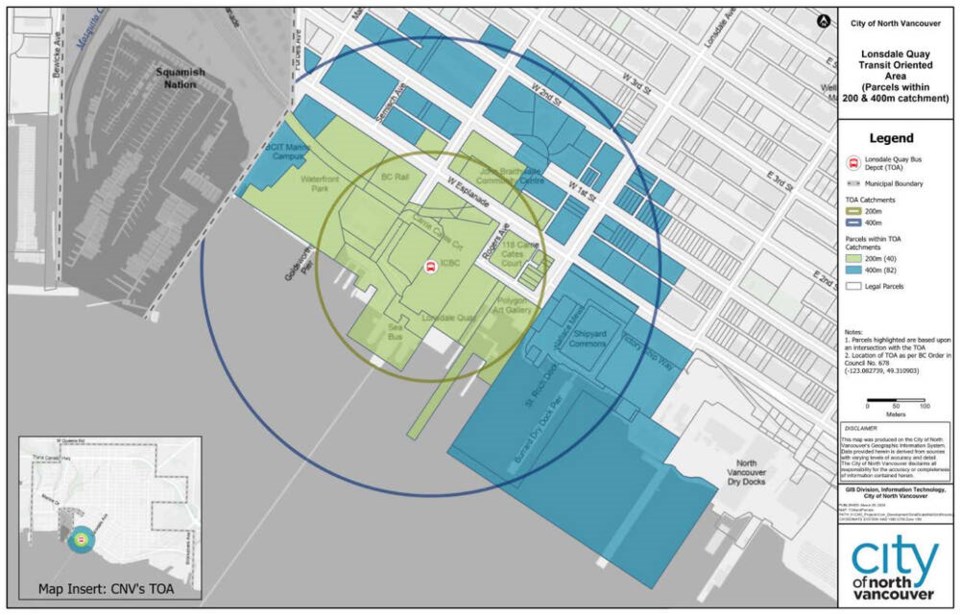The City of North Vancouver is updating its bylaws to accommodate the province’s new mandate for minimum residential density around transit hubs – but don’t expect any drastic changes in Lower Lonsdale.
Under the provincial legislation, which comes into effect at the end of June, local councils will no longer be able to reject residential redevelopments of proscribed heights and densities within “transit oriented areas” – 200 to 400 metres around transit exchanges.
Using the province’s parameters, the only transit oriented area in the City of North Vancouver is the two blocks surrounding the Lonsdale Quay Exchange.
Any property within 200 metres of a transit hub may have buildings of up to 12 storeys and a floor space ratio – which measures the total amount of floor space against the size of the entire lot – of 4.0. In the 200- to 400-metre range, the minimum allowable height is eight storeys with a density of 3.0.
Council is free to consider taller or denser proposals.
The legislation also prohibits the city from requiring a minimum number of residential parking spaces to be included, with exceptions for parking for people with disabilities.
The legislation does not automatically rezone the land, so there will still be some public process for developers to go through via council and staff, although if the developments are consistent with the official community plan, public hearings are now banned.
According to a city staff report, there are 40 properties within the 200-metre radius of Lonsdale Quay and 80 within the 400-metre radius. But the report adds, there aren’t likely to be many new developments that will benefit from the provincial rules “as many of the parcels have been recently developed with new buildings.”
All of the residential-zone lands within the 200-metre radius currently have a maximum density of 3.6. And as of late April, there were no in-stream applications within the Lonsdale Quay Exchange transit oriented area.
Mayor Linda Buchanan said council still has a vision for Lower Lonsdale, including extending the Shipyards district westward, planning for the eventual redevelopment of the ICBC head office and trying to deliver affordable housing. The transit oriented area development rules shouldn’t derail those plans, but it does make things more complicated, she indicated.
“Probably this is [legislation] that’s not necessarily as impactful to us, given the context of this particular neighbourhood and the amount of redevelopment that’s happened in the last 10 to 15 years,” she said.
Still, Buchanan was critical of the direction the province has taken. By taking decision making away from local councils, it hampers their ability to provide the kinds of amenities, infrastructure and thoughtful planning required to ensure it all works, Buchanan said.
“I don’t think many of us are extremely happy with the amount of overreach that we see from the provincial government," she said. "Perhaps I can understand the intent, but I think that local government knows best how to use the land, and we’ve been planning it for a very long time so that we can continue to build out a really great city that has all the pieces in it that we need, not just housing, but all the other pieces that make a very livable, vibrant city.”



